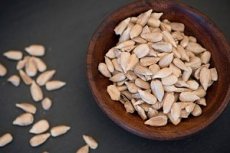
All iLive content is medically reviewed or fact checked to ensure as much factual accuracy as possible.
We have strict sourcing guidelines and only link to reputable media sites, academic research institutions and, whenever possible, medically peer reviewed studies. Note that the numbers in parentheses ([1], [2], etc.) are clickable links to these studies.
If you feel that any of our content is inaccurate, out-of-date, or otherwise questionable, please select it and press Ctrl + Enter.
Seeds in diabetes mellitus type 1 and 2: benefit and harm
Medical expert of the article
Last reviewed: 04.07.2025

Our region pleases the eye in summer and pleasantly surprises with blooming sunflower fields, and in autumn with bright colors of many pumpkins in the gardens. All because in our traditions, seeds are considered not only as food, but also as a way to spend time, relieve stress, and calm the nerves. We love conversations while cracking seeds, especially older people. And what about those who suffer from diabetes, is it possible to eat them with type 1 and type 2 diabetes?
Do seeds increase blood sugar?
This is the main question that worries diabetics. The criterion for assessing any product in the patient's menu is its glycemic index - an indicator of how carbohydrates received with food affect the level of glucose in the blood. An indicator of up to 40 U is considered low. So, with seeds, everything is fine with this. If they are prepared correctly and consumed in moderation, they can only bring benefits.
In case of gestational diabetes, which occurs during pregnancy, it is even recommended to eat them due to the content of many substances necessary for the woman's body and the future child. They help to cope with toxicosis, ensure the strength of the baby's skeletal system, relieve nervousness and depressive states.
 [ 1 ]
[ 1 ]
Benefits and harms of seeds for diabetes
Seeds are useful in raw form. When fried, most of the useful components are lost, and their fat content increases. Since people want to satisfy their taste needs in addition to the benefits, the best option is dried in the oven. But the most useful are still raw, although you should not buy them peeled because they oxidize under the influence of sunlight. Here are some facts that indicate the benefits and harm of seeds for diabetes:
- Sunflower seeds - up to half of their chemical composition is fatty oil, a fifth is proteins, a quarter is carbohydrates. There are also vitamins (E, PP, group B), minerals (magnesium, potassium, phosphorus, iron, zinc, selenium), polyunsaturated fatty acids, especially linoleic, phospholipids, carotenoids, sterols.
The main value of sunflower seeds is that 100g of the product satisfies the body's daily need for tocopherol by more than 100%. They increase immunity, strengthen the vascular system and heart muscle, reduce blood pressure, calm the nervous system, and balance carbohydrate metabolism.
They can cause harm if you exceed the recommended dose (up to 100 g per day) and eat them fried. As a result of such heat treatment, the glycemic index jumps from 10 U to 35, which means that the blood glucose level can jump. In addition, they irritate the mucous membrane of the digestive organs and can lead to the development of inflammation;
- Pumpkin seeds - they not only can, but should be included in the diet of a diabetic, because they have a low glycemic index (10 U), are rich in omega-3 and omega-6, many vitamins, micro- and macroelements, organic and amino acids, phytosterols, resinous substances. They have few carbohydrates and a lot of protein. Pumpkin seeds reduce cholesterol levels, and therefore prevent the development of atherosclerosis, strengthen the strength of cell membranes, normalize sleep, their fiber removes fat and toxins. Sufficient iron content helps to eliminate anemia. They have a diuretic and laxative effect, and raw ones, due to the presence of the amino acid cucurbitin in the seed shell, help remove worms.
At the same time, pumpkin seeds are quite high in calories and can cause harm if consumed uncontrollably.
Sunflower seed decoction for diabetes
Sunflower seeds are used to prepare medicinal decoctions and infusions. Due to their high caloric content, this method of consumption will only bring benefits. To prepare the infusion, you will need 2 tablespoons of seeds and a glass of water. The seeds are ground and poured with boiling water. After an hour of infusion, you can drink 2 times a day, 200 ml.
For the decoction, you can take the same proportions. After boiling, leave on low heat until a quarter of the liquid evaporates. Strain everything that remains, drink a spoon three times a day. Conduct a course of treatment for 2 weeks, after a five-day break you can repeat.

